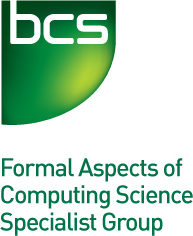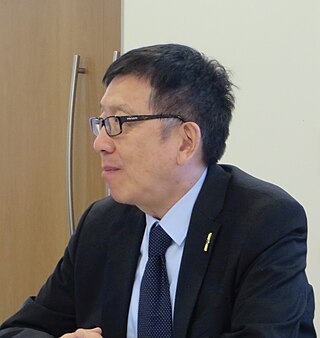Related Research Articles

The Z notation is a formal specification language used for describing and modelling computing systems. It is targeted at the clear specification of computer programs and computer-based systems in general.
A specification language is a formal language in computer science used during systems analysis, requirements analysis, and systems design to describe a system at a much higher level than a programming language, which is used to produce the executable code for a system.
In computer science, formal methods are mathematically rigorous techniques for the specification, development, analysis, and verification of software and hardware systems. The use of formal methods for software and hardware design is motivated by the expectation that, as in other engineering disciplines, performing appropriate mathematical analysis can contribute to the reliability and robustness of a design.
The Larch Prover, or LP for short, is an interactive theorem proving system for multi-sorted first-order logic. It was used at MIT and elsewhere during the 1990s to reason about designs for circuits, concurrent algorithms, hardware, and software.

Jonathan P. Bowen FBCS FRSA is a British computer scientist and an Emeritus Professor at London South Bank University, where he headed the Centre for Applied Formal Methods. Prof. Bowen is also the Chairman of Museophile Limited and has been a Professor of Computer Science at Birmingham City University, Visiting Professor at the Pratt Institute, University of Westminster and King's College London, and a visiting academic at University College London.
The B method is a method of software development based on B, a tool-supported formal method based on an abstract machine notation, used in the development of computer software.
Jean-Raymond Abrial is a French computer scientist and inventor of the Z and B formal methods.
In computer science, formal specifications are mathematically based techniques whose purpose are to help with the implementation of systems and software. They are used to describe a system, to analyze its behavior, and to aid in its design by verifying key properties of interest through rigorous and effective reasoning tools. These specifications are formal in the sense that they have a syntax, their semantics fall within one domain, and they are able to be used to infer useful information.

BCS-FACS is the BCS Formal Aspects of Computing Science Specialist Group.

Egon Börger is a German-born computer scientist based in Italy.

He Jifeng is a Chinese computer scientist.
Kevin C. Lano is a British computer scientist.
Prentice Hall International Series in Computer Science was a series of books on computer science published by Prentice Hall.
SecPAL is a declarative, logic-based, security policy language that has been developed to support the complex access control requirements of large scale distributed computing environments.
Michael Gerard Hinchey is an Irish computer scientist and former Director of the Irish Software Engineering Research Centre (Lero), a multi-university research centre headquartered at the University of Limerick, Ireland. He now serves as Head of Department of the Department of Computer Science & Information Systems at University of Limerick.

Professor Martin C. Henson FBCS FRSA is an English computer scientist based at the University of Essex. He is dean for international affairs and is affiliated to the School of Computer Science & Electronic Engineering. Henson was head of the department of computer science from 2000 to 2006.
The Message Authenticator Algorithm (MAA) was one of the first cryptographic functions for computing a message authentication code (MAC).

Sergiy A. Vilkomir was a Ukrainian-born computer scientist.

Hussein S. M. Zedan was a computer scientist of Egyptian descent, mainly based in the United Kingdom.

Kenneth ("Ken") Arthur Robinson was an Australian computer scientist. He has been called "The Father of Formal Methods in Australia".
References
- ↑ Sayeed, Ahmed (2021). Abbreviations. Sankalp Publication. p. 371. ISBN 978-9390636693.
- ↑ Yearbook of International Organizations. Vol. 1. Union of International Associations. 2017.
- ↑ Bowen, J.P. (September 1993). "Z User Group activities". JFIT News. 46: 5.
- ↑ Bowen, J.P. (1994). "Z User Meeting Activities". High Integrity Systems. 1 (1): 93–94.
- ↑ Tucker, Allen B., ed. (2004). Computer Science Handbook. CRC Press. pp. 106–24. ISBN 978-0203494455.
- 1 2 Bowen, J.P.; Nicholls, J.E., eds. (1993). Z User Workshop, London 1992. Workshops in Computing. Springer.
- ↑ "Z User Group (ZUG)". Global Civil Society Database. UIA . Retrieved 8 June 2022.
- ↑ Nicholls, J.E., ed. (1992). Z User Workshop, York 1991. Workshops in Computing. Springer.
- ↑ Bowen, J.P.; Hall, J.A., eds. (1994). Z User Workshop, Cambridge 1994. Workshops in Computing. Springer. ISBN 3-540-19884-9.
- ↑ Frappier, M., Glässer, U.; Khurshid, S., Laleau, R., and Reeves, S. (eds.), Abstract State Machines, Alloy, B and Z: Second International Conference, ABZ 2010, Orford, QC, Canada, February 22–25, 2010, Proceedings , Springer-Verlag, Lecture Notes in Computer Science, Volume 5977, 2010. ISBN 978-3-642-11810-4.
- ↑ "Z User Group Meeting (ZUG)". FM'99 World Congress. Toulouse, France. 20–24 September 1999. Archived from the original on 6 July 2007.
- ↑ Bowen, J.P.; Reeves, S. (2011). "From a Community of Practice to a Body of Knowledge: A Case Study of the Formal Methods Community". In Butler, M.; Schulte, W. (eds.). FM 2011: Formal Methods. Lecture Notes in Computer Science. Vol. 6664. Berlin, Heidelberg: Springer. pp. 308–322. doi:10.1007/978-3-642-21437-0_24.
- 1 2 "International Conference on Abstract State Machines, Alloy, B, TLA, VDM, and Z (ABZ) – International Conference of B and Z Users (ZB) – International Z User Meeting (ZUM) – Z User Workshop". DBLP . Retrieved 28 July 2022.
- ↑ Bowen, Jonathan (July 2022). "The Z User Group: Thirty Years After" (PDF). FACS FACTS . No. 2022–2. BCS-FACS. pp. 50–56. Retrieved 3 August 2022.
- ↑ Börger, E.; Butler, M.J.; Bowen, J.P.; Boca, P., eds. (2008). Abstract State Machines, B and Z, First International Conference, ABZ 2008, London, UK, September 16–18, 2008. Springer, Lecture Notes in Computer Science, Volume 5238. ISBN 978-3540876021